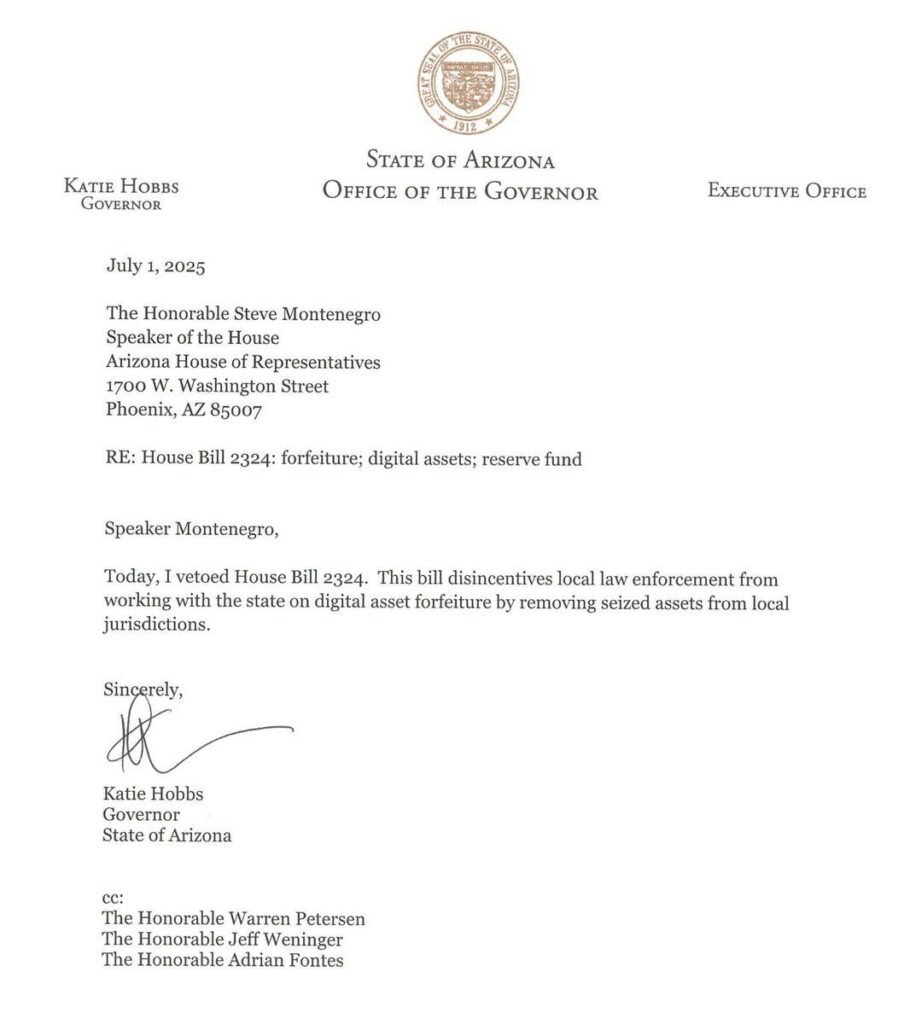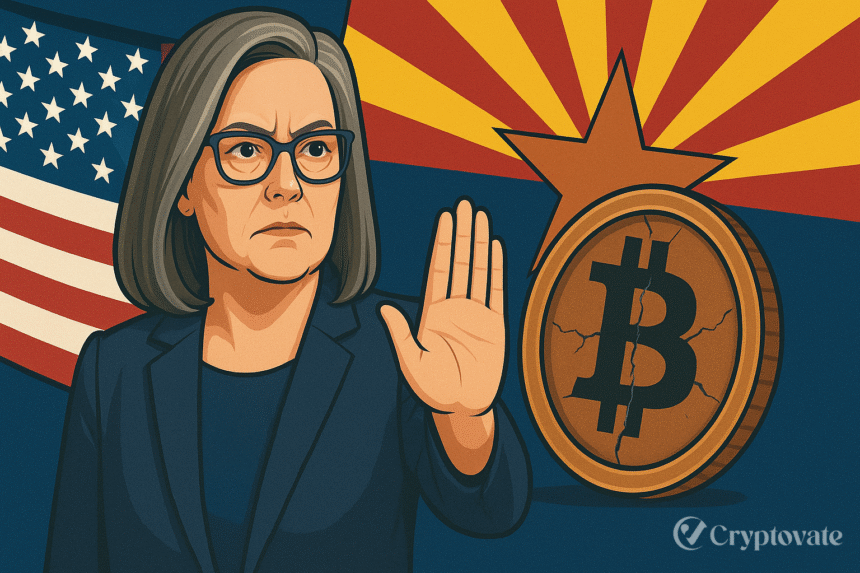– Ad –
| Getting your Trinity Audio player ready... |
On July 1, 2025, Arizona Governor Katie Hobbs delivered a significant blow to cryptocurrency advocates by vetoing House Bill 2324 (HB2324). The bill proposed creating a “Bitcoin and Digital Assets Reserve Fund” using cryptocurrencies seized through criminal forfeiture. This marks Hobbs’ third veto of crypto-related legislation in 2025, underscoring her cautious stance on integrating volatile digital assets into Arizona’s financial system. As the state grapples with balancing innovation and fiscal responsibility, this decision has sparked debate about Arizona’s role in the evolving world of cryptocurrency.
Understanding HB2324
HB2324 aimed to establish a state-managed reserve fund for cryptocurrencies, primarily Bitcoin, obtained from law enforcement seizures. The bill passed the Arizona House with a 34-22 vote on June 24, 2025, after being revived by the Senate, reflecting growing interest in positioning Arizona as a crypto-friendly state. Supporters argued that the fund would allow Arizona to capitalize on the rising value of digital assets, modernizing its financial strategy and potentially generating revenue from assets already in state possession.
The bill’s proponents saw it as a bold step toward embracing blockchain technology and reinforcing Arizona’s reputation as an innovator in the financial sector. By leveraging seized cryptocurrencies, the state could explore new economic opportunities without directly investing taxpayer funds, a point that made HB2324 appealing to fiscal conservatives and crypto enthusiasts alike.
Reasons Behind the Veto
Certainly! Here’s a paraphrase:
In her veto message, Governor Hobbs detailed two main issues. First, she argued that HB2324 could undermine cooperation between local and state law enforcement agencies. By redirecting seized digital assets to a state-managed fund, the bill risked reducing local jurisdictions’ incentives to participate in forfeiture operations, as they would lose control over those assets. This could weaken collaborative efforts critical to tackling cryptocurrency-related crimes, such as fraud and money laundering.
Of course! Here’s a paraphrase:
Secondly, Hobbs emphasized her worries regarding the unpredictable nature of cryptocurrencies. The unpredictable price swings of Bitcoin and other digital assets pose significant fiscal risks to state budgets, a point she has emphasized in her previous vetoes of crypto legislation. Her decision aligns with her broader approach of prioritizing financial stability over speculative ventures, especially in the absence of robust regulatory frameworks.
This veto follows her rejection of Senate Bills 1025 and 1373 in May 2025, which proposed allowing state investments in Bitcoin and creating a similar reserve fund. However, Hobbs demonstrated selective openness to crypto policies by signing House Bill 2749 in May. That bill established a framework for managing unclaimed digital assets and created a Bitcoin reserve fund under the state treasurer’s oversight, funded without taxpayer money. This contrast highlights Hobbs’ preference for regulated, low-risk crypto initiatives over those she deems speculative or disruptive.

Reactions and Broader Implications
The veto has elicited mixed responses. Crypto advocates and some legislators expressed disappointment, arguing that Arizona missed a chance to lead in innovative financial policy. They believe a Bitcoin reserve fund could have positioned the state as a hub for blockchain innovation, attracting tech companies and investors. Conversely, others support Hobbs’ caution, citing the need for stronger regulations to protect against the volatility and risks of cryptocurrencies.
Certainly! Here’s a paraphrase:
Lacking enough legislative backing to overturn the veto, HB2324 has been shelved, putting an end to Arizona’s current efforts to establish a state-run Bitcoin reserve. The decision reflects a broader national debate about how states should approach digital currencies—balancing the potential for economic innovation with the need for financial stability and regulatory oversight.
Also Read: Malaysia’s Crypto Revolution: SC Greenlights Bitcoin Listings Without Approval
Arizona’s Crypto Future
As cryptocurrencies gain mainstream traction, Arizona is likely to see more legislative proposals aiming to integrate digital assets into its economy. Hobbs’ vetoes suggest that future bills must address her concerns about law enforcement cooperation and fiscal risks to gain approval. The passage of HB2749 shows that well-regulated, low-risk proposals can succeed, offering a potential roadmap for crypto advocates.
For now, Arizona’s Bitcoin dreams remain on hold, but the state’s selective approach could lay the groundwork for sustainable crypto policies. Policymakers will need to craft proposals that align with Hobbs’ priorities while appealing to the growing crypto community.
FAQs
Why did Governor Hobbs veto HB2324?
Hobbs vetoed HB2324 due to concerns about disrupting law enforcement cooperation and the fiscal risks of cryptocurrency volatility.
What was HB2324’s goal?
Of course! Here’s a clear paraphrase:
HB2324 suggested creating a Bitcoin and Digital Assets Reserve Fund funded by cryptocurrencies obtained through criminal asset seizures.
Has Hobbs rejected other crypto bills?
Yes, in 2025, Hobbs vetoed Senate Bills 1025 and 1373, which focused on state Bitcoin investments and reserve funds.
Does Arizona support any crypto policies?
Yes, Hobbs signed HB2749, which regulates unclaimed digital assets and creates a Bitcoin fund without taxpayer funds.

















